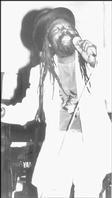Claude Wilson, Gleaner Writer

U-Roy is the man who is responsible for putting DJ on the map.
THE 1970s is arguably one of the better decades of Jamaican music. The decade saw scores of phenomenal tunes that made an impact on the music industry, bringing fame and some fortune to the artistes and reggae music.
Carl Dawkins made one of those phenomenal records in Satisfaction. The Festival Song Competition was in high gear and Eric Donaldson's Cherry Oh Baby of 1971 carried well beyond the Independence celebrations. According to 'Reggae Routes', it is probably the biggest selling reggae single of all time.
Ewart Beckford, better known as Daddy U-Roy, rode Treasure Isle rocksteady rhythms that 'woke the town' and he did 'rule the nation', holding the top three positions on the charts for 12 consecutive weeks.
"U-Roy is the man who is responsible for putting DJ on the map, both as a recording artiste in Jamaica and as a major, indirect influence on the US rap movement," says Colin Larkin, editor of The Guinness Who's Who of Reggae.
Perry Hanzell's film The Harder They Come took reggae to a new audience. In this classic Jimmy Cliff plays a gun-toting, reggae-singing Ivanhoe Martin, dramatising a real-life notorious criminal of the late 1940s.
Bob Marley & The Wailers had 13 chart hits in the 1970s, courtesy of Chris Blackwell's Island Records. Covers of Marley songs by Eric Clapton (I Shot The Sheriff) and Johnny Nash (Stir It Up, Guava Jelly) helped to put Marley's music on the American and United Kingdom charts and into the international spotlight.
Ken Boothe's adaptation of the David Gates classic Everything I Own, released in 1973, was a hit in Jamaica before making an impact in the UK and other parts of Europe.
Spirituality was a hallmark of reggae in the 1970s and writers where not loathe to use direct quotes or paraphrase parts from the Bible. Book of Rules contained biblical influences, written by Barry Llewellyn with arrangements by Leroy Sibbles; it is one of the group's most compelling songs.
However, another side of Jamaica's music mirrored the political climate of the country.
All was not well in paradise.
Social upheaval from 1974 - 76 influenced Times Tough (Toots & the Maytals), Fire Burning (Bob Andy), Move Out A Babylon (Johnny Clarke), Stop Your Fussin And Fighting (Culture), Police and Thieves (Junior Murvin), Ballistic Affair (Leroy Smart), War Inna Babylon (Max Romeo) and Run For You Life (Jackie Parris).
The general election campaign of 1972 wittingly and unwittingly placed artistes on one side or the other of the political fence.
Michael Manley enlisted Delroy Wilson's 1971 hit Better Must Come in the People's National Party (PNP) campaign although, as the singer said repeatedly, the song had nothing to do with politics. Clancy Eccles' Rod of Correction also fitted snugly in Manley's effort to win the election.
"Michael Manley, hailed by his supporters as a 'Joshua' leading his people into the promised land, brandished his 'rod of corruption' at rallies to ecstatic applause", Reggae Routes says.
The articulate and charismatic Manley promised a bright future ahead, free education, employment for the Jamaican people. Ernie Smith captured a mood of brotherhood with Hail The Man, performed by Ken Lazarus. Later Smith would lament deadly political divisiveness with Power and The Glory.
Sly and Robbie became Jamaica's leading and most distinctive rhythm section, the Rhythm Twins adding to the texture of Jamaican music. Marcia Griffiths, the indisputable Queen of reggae, made some beautiful music in the 70s that still gets a 'forward' at today's oldies parties. Lady Marcia gained crossover successes on the UK charts with Young Gifted and Black and Pied Piper, with singer-songwriter Bob Andy.
One of Alton Ellis' greatest songs, the mid 60s I'm Still In Love With You, formed the basis for Trinity's Three Piece Suit and schoolgirl duo Althea and Donna's UK number one Uptown Top Ranking.
Big Youth, the closest DJ to U-Roy during that period, is well remembered for S-90 Skank, a tribute to the popular Honda 90 motorcycle. At one time Big Youth has five songs in the Top 10 of the charts and another two in the Top 30.
Boy-wonder Dennis Brown introduced himself to the world with the album No Man Is An Island, from which came a number of classic songs. The title song, Baby Don't Do It and Westbound Train were the prelude to him becoming the Crown Prince of Reggae.
Winston Rodney and Burning Spear made music that captured the mood of the time and Marcus Garvey and Slavery Days became huge hits.
Inner Circle, Third World, Beres Hammond, the Mighty Diamonds, and Black Uhuru were all products of the 1970s, a period many old enough to know dub the better days of Jamaican music.









